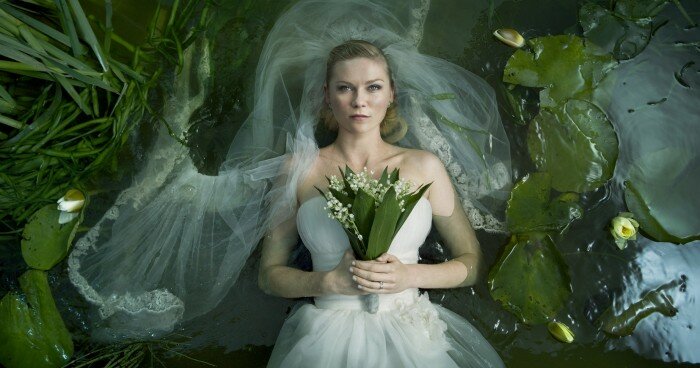Furry red monsters. Super-powered Zebra-men. The apocalypse.
No, I haven’t been driven mad by lack of sleep. These are all things that made appearances in the films I’ve been watching over the last four days, along with a butt-naked warlord, a disgraced New York politician and about half the population of Earth. And although the days have begun to blur together as the Melbourne International Film Festival (MIFF) rapidly approaches its end, the films continue to alternatingly surprise, disappoint and delight.
Work and study have kept most of my MIFF screenings this week to the late afternoon and evening. Tuesday (Day 13) began very poorly, with the not-as-funny-as-the-name-suggests documentary The Redemption of General Butt Naked. The story of a murderous African warlord who reinvents himself as an evangelical preacher, I found the film to be preachy, exploitative and generally pretty vile .
I had a far better time with my next film: Jesse Peretz’s funny if rather by-the-numbers comedy Our Idiot Brother, a film elevated by its pitch-perfect cast. My reaction to the film may have been more positive because of the garbage I’d seen directly before, and is also definitely indicative of my tendency over the last two weeks to enjoy films with a lighter, more humorous touch (as opposed to those sombre dramatic films that might spring to mind when you hear the words “film festival”). Still, I don’t wish to discredit the film, which I very much enjoyed and can’t wait to see again. I didn’t stick around for a Q&A with the director though, as I had work early the next morning and desperately needed to get to bed.
![My-Idiot-Brother[1] my idiot brother1 e1312767776535 600x288 MIFF 2011 Diary: Days 13 16](/wp-content/uploads/my-idiot-brother1-e1312767776535-600x288.jpg)
Jesse Peretz’s Our Idiot Brother.
Wednesday went the other way, starting well and ending… weird. Being Elmo was first, a fuzzy (pun absolutely intended) documentary about the man behind the world’s most popular red Muppet. Although by no means earth shattering, the movie was perfectly sweet and played the audience like a fiddle; not a dry eye in the house when Elmo meets with a Make-A-Wish child, while an off-hand reference to the puppeteer’s involvement in Dark Crystal provoked laughs of nostalgic delight.
Elmo was also very short, which meant I had plenty of time before my next screening in the same location. Wandering around the theatre lobby, I bumped into Simon Miraudo of Quickflix. Seeing a whopping sixty films (close to twice as many as I) at the festival as part of the MIFF 60th Anniversary Blog-a-thon, Simon was a little bleary eyed, but we still had a good chat about the festival, films, blogging and life in general as we waited in line for our next MIFF ’11 experience.
And what an experience it was. Zebraman 2: Attack on Zebra City kicks off pretty much straight after Zebraman 1 — which would be fine, if anyone in the audience had actually seen Zebraman 1. Eventually the film transports us twenty-five years into the future, where Tokyo has been renamed Zebra City, and ruled over by a malevolent dictator and his sadistic pop-star daughter. Quite a contrast between director Takashi Miike’s other film at the festival, the straight faced Samurai epic 13 Assassins.
![ZebramanPic1-600x399[1] zebramanpic1 600x3991 e1312773362403 MIFF 2011 Diary: Days 13 16](/wp-content/uploads/zebramanpic1-600x3991-e1312773362403.jpg)
Takashi Miike’s Zebraman 2: Attack on Zebra City.
Now believe it or not, I thought there was a lot of promise in the first twenty-or-so minutes of this film. Over-the-top to be sure, but in between the giant farting alien and the fishnet-clad police officers, there was actually some stuff about government control and media influences that seemed to actually be going somewhere. But the absurdity of the film is just too…well…absurd, and it’s also way, way too long. Overall there were definitely some funny moments and a few smacks of social commentary, but mostly it was just dumb.
Thursday was a day for three slightly — or in some cases, extremely — self-indulgent projects that went from ‘Great’, to ‘Ok’, to ‘Pretty Bloody Awful’. ‘Great’ was Life in a Day, the documentary compiled from thousands of hours of footage submitted to YouTube that charts the path of a single day on earth. Broad, but also intimate and often very moving, the film is a definite highlight of the festival so far, and a unique and very memorable experience.
The ‘Ok’ film of the night was Client 9: The Rise and Fall of Eliot Spitzer, a documentary that basically plays like a smear campaign of everyone who isn’t Eliot Spitzer. Spitzer, by the way, was a high profile New York politician poised to become the next US President, until he was caught keeping the company of some very expensive escort girls. The subject matter is definitely interesting, but the blatant bias of the film got a little annoying (and this coming from someone who mostly agrees with Spitzer’s politics). Still, it played great to the clearly very liberal festival audience, and was sent off with an especially generous dose of applause.
![Client-9[1] client 91 e1312773509474 600x300 MIFF 2011 Diary: Days 13 16](/wp-content/uploads/client-91-e1312773509474-600x300.jpg) Alex Gibney’s Client 9: The Rise and Fall of Eliot Spitzer.
Alex Gibney’s Client 9: The Rise and Fall of Eliot Spitzer.
Last and certainly least was Sion Sono’s Guilty of Romance. Sono, I’ll admit, wasn’t a name I was familiar with before examining the MIFF programme in the weeks leading up to the festival, but a quick Wikipedia search revealed his reputation for making films with extreme and disturbing content. Guilty of Romance was one of two films he had the MIFF this year; I’m told Cold Fish, which I couldn’t make due to scheduling conflicts, was the considerably better of the two.
Guilty of Romance tells the story of a straight-laced Japanese housewife who slowly starts to experiment with her sexuality, first as a nude model, then a porn-star, before eventually taking the step into full-blown prostitution. Sono shoots the film beautifully, and there are plenty of memorable, bizarre and disturbing images peppered throughout. But as the story escalates it just gets dumber and dumber – dialogue goes around in circles, characters behave in ways that don’t make any sense and eventually even the sex and violence becomes kind of a bore. It’s by no means the worst film of MIFF’11, but it’s definitely amongst the stupidest.
But wouldn’t you know it; MIFF saved the worst for last. My Friday actually began great, as I got the chance to meet with long time blogging friend Andy Buckle of Andy Buckle’s Film Emporium, down from Sydney for the last few days of the festival. We were both pretty excited for our back-to-back evening screenings of two of the festivals most anticipated films: Lars von Trier’s Melancholia (pictured atop of this article) and Lena Dunham’s indie comedy Tiny Furniture. We were also joined in the former screening by Julian Buckeridge of At The Cinema.
![Tiny-Furniture-still-shot[1] tiny furniture still shot1 e1312773958684 600x259 MIFF 2011 Diary: Days 13 16](/wp-content/uploads/tiny-furniture-still-shot1-e1312773958684-600x259.jpg)
Lena Dunham’s Tiny Furniture.
Now, before I give my thoughts on either film, I should acknowledge up front that most of the other critics loved both of them; Julian loved Melancholia, while Glenn Dunks of Stale Popcorn counts both them amongst his very favourites of the festival (and the guy’s seen nearly sixty films!) Personally, however, I couldn’t stand either one. Melancholia, despite some beautiful imagery, was drawn out and tedious, and played like Antichrist with all the interesting and/or horrifying content removed. Tiny Furniture was better, but its selfish, annoying, “oh-aren’t-we-so-witty” characters drove me up the wall. Expect two extremely scathing reviews of both films in the coming days.
So now we’re into the home stretch. Saturday and Sunday are the last two days of the festival, but they’re also easily my busiest – I’m seeing nine films, including the highly raved about Martha Marcy May Marlene and the award winning Once Upon A Time In Anatolia. Let’s hope they’re an improvement on the last lot.
—
Tom Clift is a web-based film journalist from Melbourne, Australia. Visit his website here: http://reviewsbytom.blogspot.com.
You can read all of Tom Clift’s coverage of MIFF 2011 here.
 Follow the author Tom Clift on Twitter.
Follow the author Tom Clift on Twitter.



![MIFF_2011[1] miff 20111 MIFF 2011 Diary: Days 13 16](/wp-content/uploads/miff_20111.jpg)










